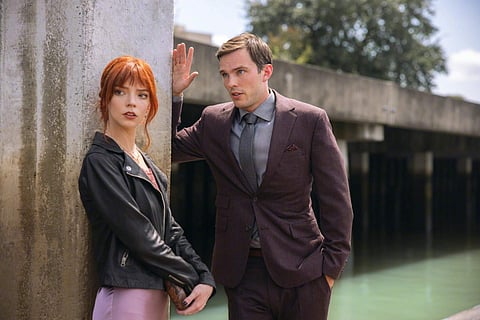The Menu Movie Review: A neatly made dark comedy with the right amount of thrills
Rating:(3 / 5)
The Menu is a dark comedy that begins as a satire on the culture that envelops food including haute cuisine, foodie culture, and food criticism. With its intentions thrown at us from the very beginning, it still manages to deftly sidestep our predictions by being more than just a satire on culinary snobbery. As the film unravels, we find that it also offers commentary on the class divide, working culture, familial trauma, workplace harassment, and the spurious nature of fanboy culture.
Director: Mark Mylod
Cast: Ralph Fiennes, Anya Taylor-Joy, Nicholas Hoult, Hong Chau, Janet McTeer, Judith Light and John Leguizamo
A select group of extremely privileged individuals buys their way into an exclusive fine-dining experience on a remote island. We enter the story through the impassive eyes of the audience surrogate Margot (Anya Taylor-Joy), who is only there because her new boyfriend Tyler (Nicholas Hoult)—an insufferable foodie—has bought them tickets. Joining them on this culinary expedition are a self-absorbed food critic, a past-his-prime actor and his girlfriend, a trio of gratingly boisterous finance bros, and an old wealthy couple. Margot, who we are reminded frequently that she is not supposed to be there, serves as the vehicle to mount the commentary on the gaping class divide, at times too crudely.
Ralph Fiennes, as the executive chef Julian Slowik, walks onto the frame dripping with the intimidating demeanour of a school principal devours the chatter and fragmented attention every time he steps into the room. He delivers a performance so refined that with every tilt of the head and with every glance thrown, we could sense a turbulent wave of emotions seething right beneath a tenuous civilised countenance.
We are introduced to every character as the chef and his obsequious crew is seen meticulously preparing every meal. As Julian Slowik describes the conceptual heart of every course, the dish is served with the precision of a marching band. The concepts enveloping every meal spin progressively out of normalcy with every course and the bizarreness reaches a startling crescendo with the sous chef’s special named The Mess. Every scene afterwards is filled with Chef Slowik’s forceful rant about how every group of customer present represents the worst aspects of the food industry that poisoned his art. Shown as a man utterly obsessed with his profession, Slowik sees his work as an art form and those present as those that sullied the heart and soul of it. The ingenuity of the story lies in the fact that you could hold almost any industry that marries art and business in the place of the food industry here and the film would still work.
The Menu could be a critique of the state of the film industry or could be about the corporatization of the music industry and it would still work. Another bit of ingenuity in writing comes towards the end, through Margot’s counter-argument to Chef Slowik’s reasoning for his despair fuelled aggression.
The visual language of The Menu perfectly captures the elegance and grandiosity of high-end restaurants, accentuating the style and dread in equal measures at exactly the right moments. The dark humour is a terse yet effective addition and does its job without calling too much attention to itself. It is used like spice in European cuisine; not forceful, barely there and could only be appreciated by those with the palate for it.
Masterful filmmaking aside, the film still falters with its attempted commentary on the class divide. Towards the end, the ultra-rich are shown as self-aware, remorseful, and tainted with guilt while the ‘relatable’ lower class Margot is shown as being somehow better for standing outside of the ‘snobby’ pretentiousness’ of the uber-rich. Although it does not seem intentional, the film wants those on the lower end of the social hierarchy to be content with the non-pretentious simpler state of being instead of the chaotic higher state of social existence that would purportedly rob their art of the joy it gives them and fill it with soul-sucking obsession instead. With this thin hint of patronization, the film ironically ends up sounding like the section of society it aims to critique.
Despite its overbearing ingredients of botched social commentary, the film still offers a flavourful experience and satisfaction that lingers well beyond the credits. Simplistic in essence, The Menu is fast food served in Haute cuisine fashion but good food is still good food.

